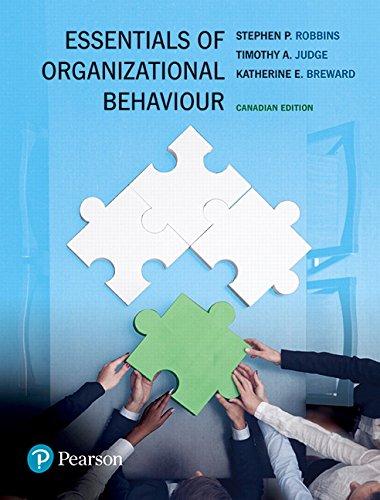In 2010 the CBCs The Fifth Estate profiled Peter Nygard, founder and CEO of Nygard, a successful
Question:
In 2010 the CBC’s The Fifth Estate profiled Peter Nygard, founder and CEO of Nygard, a successful clothing retailer catering largely to working-age women. The documentary, titled Larger Than Life, presented an unflattering portrait of an abusive, egotistical sexual predator who had difficulty reigning in his prodigious temper. Although Peter Nygard himself disputes some of the content presented in the documentary, several different people reported that he was fond of telling employees “I am God here” while making difficult and sometimes impossible demands.
Peter Nygard owns a large estate in the Bahamas that is used to entertain.
In one example of goal setting “Nygard style,” the CBC reported that Nygard had asked that groundskeepers ensure mosquitos were controlled in the resort through fogging and other chemical controls. The tennis courts were especially prone to mosquitos, and Peter had instituted a simple system: Every time a guest was bitten by a mosquito while playing tennis he would fine the groundkeeper on shift at the time. Fines ranged from $5 to $15 per incident. This incentive system was ultimately deemed illegal, because multiple fines might easily result in employees making little to nothing for their work. In interviews collected by the CBC, some employees commented that the complex system of fines (of which the mosquito fines were just one example), combined with the vulnerability of the workers and Peter’s frequent rages and abusive behaviour, created working conditions comparable to slavery.
Discussion Questions
1. Using goal-setting theory as your framework, explain why Nygard’s “mosquito fine” policy would be ineffective at motivating desirable job task behaviours.
2. Using goal-setting theory as your framework, devise an incentive system that would maximize performance—in this case meaning careful attention to mosquito control. Explain and justify your strategy.
3. What impact would abusive behaviour and frequent temper tantrums by the CEO be likely to have on short-term employee motivation? What about long-term motivation and engagement?
Explain your answer using motivational theory to justify your -
perspective.
Step by Step Answer:

Essentials Of Organizational Behaviour
ISBN: 9780134182971
1st Canadian Edition
Authors: Stephen P. Robbins, Timothy A. Judge, Katherine Breward





